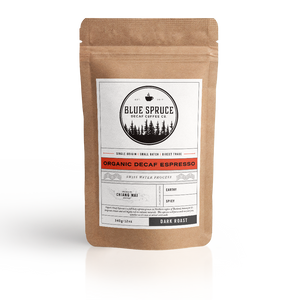Can Decaf Coffee Help with Sleep Disturbances?
Posted By bluespruce decaf
Body
Coffee is usually associated with a morning pick me up drink. Therefore coffee does not fit with the idea of providing a restful night’s sleep. This thought may sound counterintuitive but not when you switch to decaf coffee.
The relationship between decaf coffee and sleep disturbances is a topic worth exploring. Let’s explore this intriguing question and find out when decaf coffee can contribute to better sleep or not.
What is the link between caffeine and sleep?
The primary culprit behind sleep disturbances related to coffee is caffeine. Coffee beans naturally have a stimulant called caffeine. Consuming caffeine is bad for your sleep schedule. Caffeine blocks adenosine which is responsible for relaxation and sleepiness and caffeine can affect it. Decaf coffee is made with a process to remove a significant portion of caffeine. So it can be a potential solution for those who enjoy the taste of coffee but wish to minimize caffeine related sleep issues.

How does decaf coffee beans put up with your sleep quality?
Decaf coffee removes up to 97% of caffeine found in regular coffee. The reduced caffeine content is therefore a suitable option for individuals who are sensitive to caffeine. Decaf allows such people to still indulge in a cup of coffee later in the day. Some studies suggest that moderate consumption of decaf coffee may have minimal impact on sleep quality for most individuals.
When is the right time to drink decaf espresso?
The timing of decaf coffee consumption plays a crucial role in its potential impact on sleep. Consuming decaf coffee in the evening or close to bedtime might still pose a risk for some individuals, especially those who are highly sensitive to caffeine. It’s recommended to be mindful of personal caffeine sensitivity and experiment with consuming decaf coffee earlier in the day to gauge its effects on sleep.
Can you use organic decaf coffee as a ritual for relaxation?
Beyond the caffeine content, the act of sipping a warm beverage like decaf coffee can serve as a relaxing ritual before bedtime. The warmth and familiar aroma may create a calming effect. It contributes to a winding down routine. The routice can signal to the body that it’s time to prepare for sleep. Drink decaf coffee in the evening routine to enjoy a warm drink with no potential sleep disrupting effects.

What are the other health benefits of switching to decaf coffee?
- Rich in Antioxidants: Decaf coffee retains many antioxidants. It is good for cellular health.
- Heart Health: Some studies suggest decaf coffee may contribute to cardiovascular health as it can reduce certain risk factors.
- Digestive Health: Decaf coffee is less acidic than regular coffee. Therefore it is a gentler option for those with acid reflux or sensitive stomachs.
- Mental Well-being: The act of enjoying decaf coffee can provide a comforting ritual. It also contributes to a relaxed state of mind.
- Hydration: Decaf coffee contributes to daily fluid intake without the diuretic effects of caffeine.
Bottom line
The relationship between decaf coffee and sleep disturbances can vary from person to person. Decafa coffee definitely reduces the risk of caffeine related sleep issues. Individuals who are highly sensitive to caffeine should be careful about the timing of drinking decaf coffee. Keep in mind that moderation is the key when it comes to health. If you love coffee but looking for ways to minimize caffeine intake for better sleep then try Blue Spruce Decaf Coffee Co. The brand offers the best decaf espresso beans which are 100% organic and Swiss water processed. Shop from their wide range of blends and flavor profiles to take a step into the right direction.










Comments